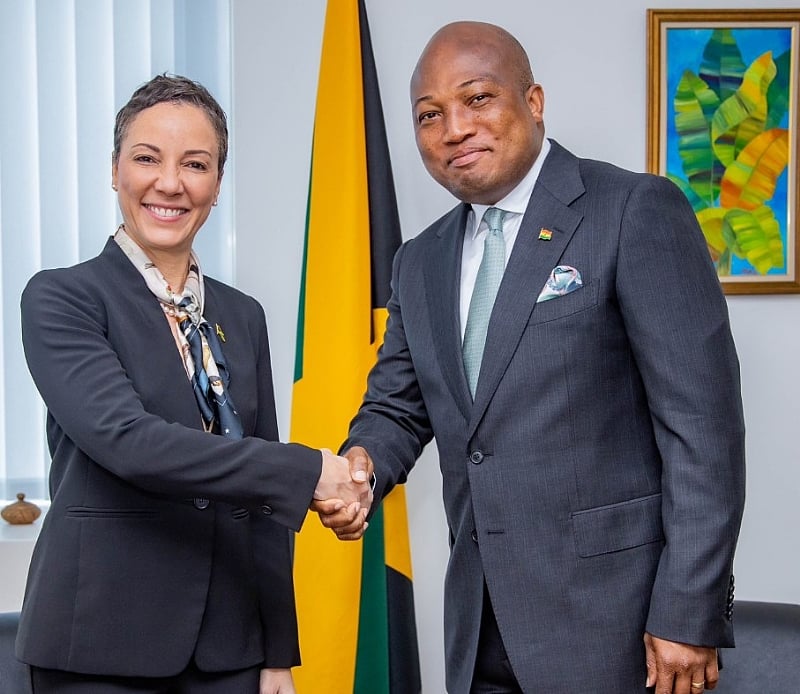The governments of Ghana and Jamaica have embarked on a significant bilateral partnership aimed at facilitating the movement of skilled professionals, specifically nurses and teachers, from Ghana to Jamaica. This agreement, formalized during the Organization of African, Caribbean, and Pacific States (OACPS) conference in Brussels, represents a strategic move by both nations to address critical workforce needs while strengthening their historical ties. Jamaica’s growing demand for qualified healthcare professionals and educators will be met by Ghana’s readily available pool of trained personnel, creating a mutually beneficial exchange. This initiative not only addresses practical workforce requirements but also symbolizes a deeper connection between the two nations, fostering stronger diplomatic relations and promoting cross-cultural understanding.
The genesis of this agreement lies in the successful implementation of a similar program between Ghana and Barbados in 2020. The positive outcomes of this earlier collaboration, which saw hundreds of Ghanaian nurses successfully integrated into the Barbadian healthcare system, served as a blueprint and provided valuable insights for the newly established Ghana-Jamaica partnership. This prior experience has allowed both countries to approach the new agreement with a greater understanding of the logistical and administrative requirements, setting the stage for a smoother and more efficient implementation process. By learning from the Barbados model, Ghana and Jamaica can anticipate and mitigate potential challenges, ensuring a more positive experience for the professionals involved and maximizing the benefits for both nations.
The agreement encompasses a range of provisions designed to facilitate the seamless integration of Ghanaian professionals into Jamaican society. These include streamlined immigration procedures, expedited credential recognition processes, and competitive compensation packages. By simplifying the bureaucratic hurdles often associated with international relocation, the agreement aims to make the transition as smooth as possible for Ghanaian nurses and teachers. The commitment to fast-tracked credential recognition ensures that qualified professionals can begin working in Jamaica without unnecessary delays, addressing the immediate workforce needs of the country. Furthermore, the promise of attractive compensation packages, comparable to international standards, incentivizes Ghanaian professionals to consider Jamaica as a desirable destination for career advancement.
The implications of this agreement extend beyond the immediate benefits of filling workforce gaps. It signifies a strengthening of diplomatic ties between Ghana and Jamaica, reinforcing their shared historical and cultural connections. This collaboration opens avenues for broader cooperation in various sectors, including trade, education, agribusiness, tourism, culture, and sports. By fostering a spirit of mutual support and collaboration, this partnership can contribute to the economic and social development of both nations. It also provides a platform for sharing best practices and knowledge in various fields, fostering innovation and progress in both countries.
The initiative also underscores the importance of South-South cooperation in addressing global challenges. By leveraging their respective strengths and resources, Ghana and Jamaica are demonstrating the potential of developing nations to collaborate effectively in finding solutions to shared problems. This partnership serves as a model for other countries facing similar challenges, highlighting the benefits of mutual support and resource sharing. It also contributes to a more equitable and balanced global order, where developing nations play a more prominent role in shaping international partnerships.
In conclusion, the bilateral agreement between Ghana and Jamaica to facilitate the movement of nurses and teachers signifies a strategically important partnership with far-reaching implications. It not only addresses the immediate workforce needs of Jamaica but also fosters stronger diplomatic ties, promotes cross-cultural understanding, and strengthens South-South cooperation. By streamlining immigration processes, expediting credential recognition, and offering competitive compensation packages, the agreement ensures a smooth transition for Ghanaian professionals. This initiative serves as a testament to the power of collaboration and mutual support in addressing shared challenges and building a more interconnected and prosperous global community.














